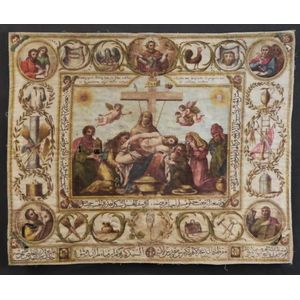Antique French Perfume Cabinet with Aqua Bottles
You must be a subscriber, and be logged in to view price and dealer details.
Subscribe Now to view actual auction price for this item
When you subscribe, you have the option of setting the currency in which to display prices to $Au, $US, $NZ or Stg.
- Faceting - Faceting is a technique of removing material from a curved surface, to give a series of flat surfaces but retaining the profile of the original surface.
The technique is most commonly associated with diamond cutting where the various cuts used such as rose cut and brilliant cut, add life and sparkle to the stone, whilst at the same time removing as little of the stone as possible.
Faceting by grinding is also used to decorate glass. The stems of many drinking glasses are decorated by cutting a series of flat surfaces on a circular stem, and hollow vessels such as vases may have faceted surfaces.
In furniture faceting is often applied to legs of tables and chairs, where a circular baluster shaped section is flattened so as to form an octagonal section. - Bronze - An alloy of copper and tin, traditionally in the proportions of about 9 parts of copper to 1 part of tin.
The discovery of bronze in Western Asia in the 4th century enabled people to create metal objects which were superior to those previoulsy possible because of its strength and hardness, and it has been used throughout the world for weapons, coins, tools, statuary and other decorative items.
It is very fluid in a molten state, and its hardness, strength when set, and non-corrosive properties makes it most suitable for casting sculpture. - Foliate - Decorated with leaves or leaf-like forms.
- Circa - A Latin term meaning 'about', often used in the antique trade to give an approximate date for the piece, usually considered to be five years on either side of the circa year. Thus, circa 1900 means the piece was made about 1900, probably between 1895 and 1905. The expression is sometimes abbreviated to c.1900.
This item has been included into following indexes:
Visually similar items

A fine Tibetan Buddhist silk thangka Mandala painting, mid 20th century. 82 x 58 cm (image size)

Still life floral oil painting signed Cardinal lower right, in gilt frame. 50 x 40 cm

A framed sampler signed Ann Bond

19th century religious print. 'The Descent From the Cross,' printed on fabric, with symbols & vignettes surrounding a border of Greek & Arabic text. Greek Orthodox or Eastern Catholic. Hand coloured printed fabric 34 x 41 cm
